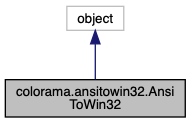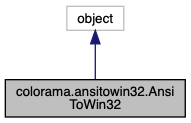colorama.ansitowin32.AnsiToWin32 Class Reference
Inheritance diagram for colorama.ansitowin32.AnsiToWin32:

Collaboration diagram for colorama.ansitowin32.AnsiToWin32:

Public Member Functions | |
| def | __init__ (self, wrapped, convert=None, strip=None, autoreset=False) |
| def | should_wrap (self) |
| def | get_win32_calls (self) |
| def | write (self, text) |
| def | reset_all (self) |
| def | write_and_convert (self, text) |
| def | write_plain_text (self, text, start, end) |
| def | convert_ansi (self, paramstring, command) |
| def | extract_params (self, command, paramstring) |
| def | call_win32 (self, command, params) |
| def | convert_osc (self, text) |
Public Attributes | |
| wrapped | |
| autoreset | |
| stream | |
| strip | |
| convert | |
| win32_calls | |
| on_stderr | |
Static Public Attributes | |
| ANSI_CSI_RE = re.compile('\001?\033\[((?:\d|;)*)([a-zA-Z])\002?') | |
| ANSI_OSC_RE = re.compile('\001?\033\]((?:.|;)*?)(\x07)\002?') | |
Detailed Description
Implements a 'write()' method which, on Windows, will strip ANSI character sequences from the text, and if outputting to a tty, will convert them into win32 function calls.
Constructor & Destructor Documentation
◆ __init__()
| def colorama.ansitowin32.AnsiToWin32.__init__ | ( | self, | |
| wrapped, | |||
convert = None, |
|||
strip = None, |
|||
autoreset = False |
|||
| ) |
Member Function Documentation
◆ call_win32()
| def colorama.ansitowin32.AnsiToWin32.call_win32 | ( | self, | |
| command, | |||
| params | |||
| ) |
Here is the caller graph for this function:

◆ convert_ansi()
| def colorama.ansitowin32.AnsiToWin32.convert_ansi | ( | self, | |
| paramstring, | |||
| command | |||
| ) |
Here is the call graph for this function:

Here is the caller graph for this function:

◆ convert_osc()
| def colorama.ansitowin32.AnsiToWin32.convert_osc | ( | self, | |
| text | |||
| ) |
Here is the caller graph for this function:

◆ extract_params()
| def colorama.ansitowin32.AnsiToWin32.extract_params | ( | self, | |
| command, | |||
| paramstring | |||
| ) |
Here is the caller graph for this function:

◆ get_win32_calls()
| def colorama.ansitowin32.AnsiToWin32.get_win32_calls | ( | self | ) |
◆ reset_all()
| def colorama.ansitowin32.AnsiToWin32.reset_all | ( | self | ) |
Here is the call graph for this function:

Here is the caller graph for this function:

◆ should_wrap()
| def colorama.ansitowin32.AnsiToWin32.should_wrap | ( | self | ) |
True if this class is actually needed. If false, then the output stream will not be affected, nor will win32 calls be issued, so wrapping stdout is not actually required. This will generally be False on non-Windows platforms, unless optional functionality like autoreset has been requested using kwargs to init()
◆ write()
| def colorama.ansitowin32.AnsiToWin32.write | ( | self, | |
| text | |||
| ) |
Here is the call graph for this function:

Here is the caller graph for this function:

◆ write_and_convert()
| def colorama.ansitowin32.AnsiToWin32.write_and_convert | ( | self, | |
| text | |||
| ) |
Write the given text to our wrapped stream, stripping any ANSI sequences from the text, and optionally converting them into win32 calls.
Here is the call graph for this function:

Here is the caller graph for this function:

◆ write_plain_text()
| def colorama.ansitowin32.AnsiToWin32.write_plain_text | ( | self, | |
| text, | |||
| start, | |||
| end | |||
| ) |
Here is the call graph for this function:

Here is the caller graph for this function:

Member Data Documentation
◆ ANSI_CSI_RE
|
static |
◆ ANSI_OSC_RE
|
static |
◆ autoreset
| colorama.ansitowin32.AnsiToWin32.autoreset |
◆ convert
| colorama.ansitowin32.AnsiToWin32.convert |
◆ on_stderr
| colorama.ansitowin32.AnsiToWin32.on_stderr |
◆ stream
| colorama.ansitowin32.AnsiToWin32.stream |
◆ strip
| colorama.ansitowin32.AnsiToWin32.strip |
◆ win32_calls
| colorama.ansitowin32.AnsiToWin32.win32_calls |
◆ wrapped
| colorama.ansitowin32.AnsiToWin32.wrapped |
The documentation for this class was generated from the following file:
